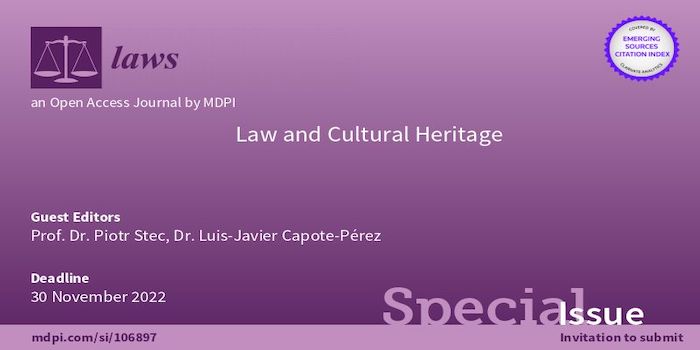
Laws Special Issue "Law and Cultural Heritage"
Culture is included in the COVID-19 recovery plans. Cultural heritage not only reminds us of the past, but serves as a catalyst for sustainable development and peacebuilding. The idea of the Special Issue is to present different views and perspectives on the current challenges in the cultural heritage law.
Cultural heritage law is one of the emerging fields of academic legal research. What makes it unique is that it both challenges established legal concepts, such as the one of property and ownership, and is strongly connected with other disciplines (from art history through heritage studies to management, politics, and technology). The holistic approach to cultural heritage, involving tangible and intangible elements with visible natural components, affects the methodology of research, not only in cultural heritage studies but also in legal studies.
Cultural heritage constitutes a non-renewable resource. It is also perceived as a catalyst for the development. Therefore, it is necessary to consider all functions of cultural heritage while working on new legal regulations and new policy models. The problem of cultural rights together with the role of communities cannot be ignored as well. The general aim is to search for the balance between old and new, between access to cultural heritage and its protection and decision to what extent the resources will be transferred to future generations. However, given the diverse legal traditions, it has to always be tailored and take all the specificities into account.
In recent years, we have witnessed a discussion on heritage as the fourth estate, art frauds, the return of cultural assets to former colonies, and the restitution of the spoils of war. New problems emerge within the development of art market and new technologies: use and abuse of art as an alternative investment, new artistic and commercial concepts (such as the NFT) (non-fungible tokens), or the use of blockchain technology to create electronic “passports” for cultural goods containing their provenance history.
The purpose of this Special Issue is to bring together academic lawyers and scholars representing non-classical approaches to law who share the common interest in cultural property. We are open to authors representing various methodological approaches, from conventional black-letter analysis to critical legal studies and computational jurisprudence. We would also welcome authors presenting different national and regional perspectives.
Prof. Dr. Piotr Stec
Dr. Luis-Javier Capote-Pérez
Guest Editors
Etiquetas: Laws, Cultural Heritage Law, Revistas